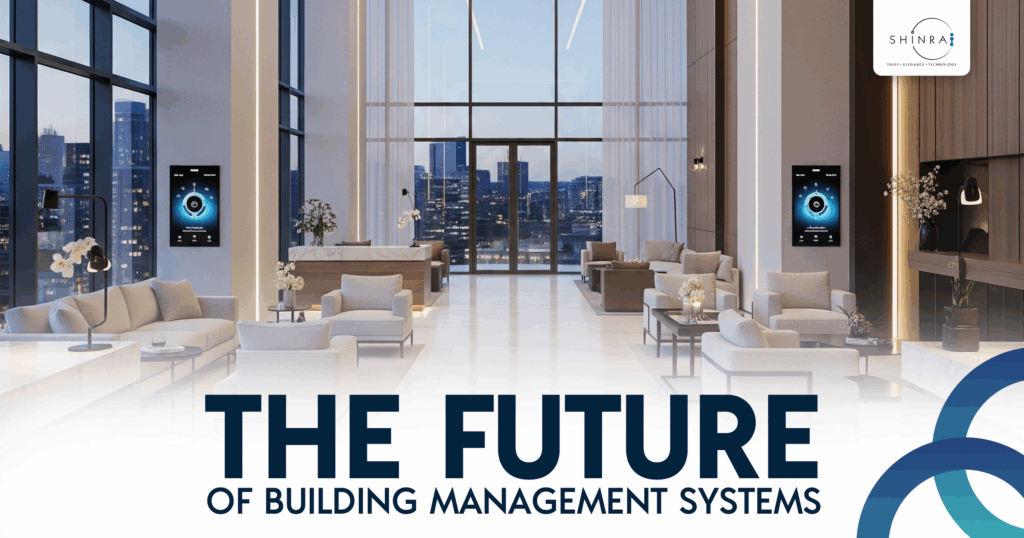In today’s rapidly evolving world, buildings are no longer just structures, they are becoming intelligent ecosystems that adapt, learn, and respond to the needs of their occupants. At the forefront of this transformation is the integration of Artificial Intelligence (AI), the Internet of Things (IoT), and Cloud Computing into Building Management Systems (BMS). These technologies are revolutionizing how buildings operate, offering enhanced efficiency, sustainability, and occupant comfort.
Leading this innovation in Sri Lanka, Shinrai Smart Home delivers advanced BMS solutions that seamlessly combine AI, IoT, and Cloud to create smarter, more connected, and sustainable buildings.
Understanding Building Management Systems (BMS)
A Building Management System (BMS) is a centralized control system that manages and monitors a building’s mechanical and electrical equipment such as HVAC, lighting, fire systems, and security. Traditionally, BMS were standalone systems, often limited in functionality and flexibility. However, with the advent of AI, IoT, and Cloud technologies, BMS have evolved into intelligent, interconnected platforms capable of real-time data analysis and decision-making.
The Role of AI in Smart Buildings
Predictive Maintenance
AI algorithms analyze data from various sensors to predict potential equipment failures before they occur. This proactive approach allows for timely maintenance, reducing downtime and extending the lifespan of building assets.
Energy Optimization
AI-driven systems can optimize energy consumption by analyzing patterns and adjusting settings in real-time. For instance, AI can adjust HVAC settings based on occupancy and weather forecasts, leading to significant energy savings.
Enhanced Security
AI enhances building security through advanced surveillance systems that can detect unusual activities and alert security personnel in real-time. Facial recognition and anomaly detection are examples of AI applications improving safety.
The Impact of IoT on Building Management
Real-Time Monitoring
IoT devices provide continuous data streams from various building systems, enabling real-time monitoring and control. This connectivity ensures that building managers can respond promptly to any issues that arise.
Integration of Systems
IoT facilitates the integration of disparate building systems, allowing them to communicate and function cohesively. For example, IoT enables the synchronization of lighting, HVAC, and security systems to optimize building performance.
Occupant Experience
IoT enhances the occupant experience by providing personalized environmental controls. Sensors can detect occupancy and adjust lighting and temperature accordingly, ensuring comfort and energy efficiency.
Cloud Computing: The Backbone of Smart Buildings
Centralized Data Management
Cloud platforms offer centralized storage and processing of data collected from various building systems. This centralized approach simplifies data management and analysis, providing valuable insights into building operations.
Scalability and Flexibility
Cloud computing provides scalability, allowing building systems to expand and adapt as needed. This flexibility ensures that building management systems can evolve with technological advancements and changing requirements.
Remote Access and Control
Cloud-based BMS enables building managers to access and control systems remotely, providing the ability to monitor and manage building operations from anywhere, at any time.
Sustainability and Smart Buildings
The integration of AI, IoT, and Cloud technologies contributes significantly to building sustainability efforts. These technologies enable energy-efficient operations, reduce carbon footprints, and promote the use of renewable energy sources. For instance, AI can optimize energy usage by adjusting systems based on real-time data, leading to reduced energy consumption and lower greenhouse gas emissions.
The Future Outlook
The future of building management lies in the continued integration of advanced technologies. As AI, IoT, and Cloud computing continue to evolve, building management systems will become even more intelligent, efficient, and sustainable. Emerging technologies such as 5G connectivity, edge computing, and digital twins are set to further enhance building operations, offering unprecedented levels of control and optimization.
Shinrai Smart Home: Leading the Way in Smart Building Solutions
Shinrai Smart Home is at the forefront of this technological revolution, offering cutting-edge Building Management Systems powered by ABB’s Building Automation System (BAS). Their solutions integrate AI, IoT, and Cloud technologies to provide real-time data and actionable insights, enhancing operational efficiency, occupant comfort, and safety. With features like scheduling, alarms, and intuitive visual interfaces, Shinrai’s BMS solutions are scalable and adaptable, making them suitable for buildings of any size or complexity.
Conclusion
The integration of AI, IoT, and Cloud technologies into Building Management Systems is transforming the way buildings operate. These advancements lead to smarter, more efficient, and sustainable buildings that enhance the occupant experience and contribute to environmental conservation. As technology continues to evolve, the future of building management looks promising, with intelligent systems at the helm of this transformation.
To explore advanced smart building solutions, visit Shinrai Smart Home and discover how you can create a truly intelligent living or working space with their cutting-edge Building Management Systems.

